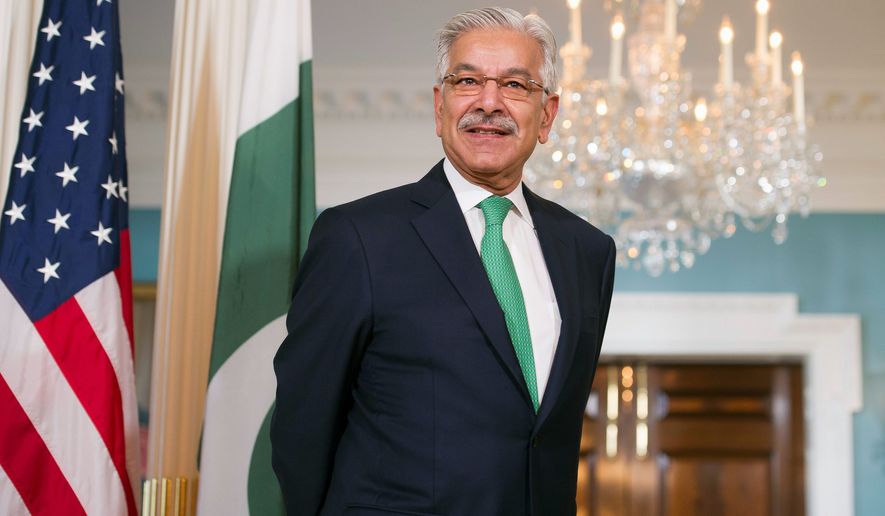U.S.-Pakistani relations have taken a “new turn” in the aftermath of President Trump’s tough rhetoric and hard-line stance against Islamabad as part of Washington’s new national security strategy for South Asia, visiting Pakistani Foreign Minister Khawaja Muhammad Asif said Thursday.
Top Pakistani diplomats, led by Mr. Asif, attempted to clear the air during meetings with Secretary of State Rex W. Tillerson at the State Department this week in Washington, he told reporters during a roundtable discussion at the Pakistani Embassy.
“The bilateral relationship between the U.S. and Pakistan has taken a new turn” after Mr. Trump endorsed a new approach for winning the 16-year U.S. war in Afghanistan in August, Mr. Asif said in his first visit to the U.S. since the new strategy’s rollout. Mr. Trump took dead aim at what he said were Pakistan’s continuing ties to extremists.
“We can no longer be silent about Pakistan’s safe havens for terrorist organizations, the Taliban and other groups that pose a threat to the region and beyond,” Mr. Trump said at the time, adding, “Pakistan has much to gain from partnering with our effort in Afghanistan. It has much to lose by continuing to harbor criminals and terrorists.”
The administration has also courted Pakistan’s regional rival, India.
Mr. Asif said these moves have produced a “trust deficit” in the U.S.-Pakistan relationship. Islamabad, he added, has chafed at “hollow allegations” of collaboration with extremist groups like the Haqqani network and Pakistan Taliban, which have been responsible for some of the most spectacular terrorist attacks against U.S. and local forces inside Afghanistan.
On Tuesday Chairman of the Joint Chiefs of Staff Gen. Joseph Dunford said there were still links between the ISI, Pakistan’s powerful intelligence service, and violent extremist groups operating inside Pakistan and Afghanistan.
“I think it’s clear to me that the ISI has connections with terrorist groups,” Gen. Dunford told the Senate Armed Services Committee.
But Mr. Asif argued that no other country, aside from the U.S., can fight violent extremist groups inside Pakistan and in the region. He challenged Gen. Dunford: “Give us locations, give us coordinates, and we will bomb it.” He said Pakistan’s ability to influence the Taliban had been hurt when a U.S. drone strike killed Taliban leader Mullah Akhtar Mansour in Pakistan’s southwestern Balochistan province in May 2016.
Addressing similar criticisms from Defense Secretary James Mattis at the same Senate hearing, Mr. Asif said, “That is not what you tell 70-year-old friends.”
Mr. Mattis is scheduled to visit Islamabad in the coming weeks, but Pentagon Press Secretary Dana White declined to provide details of that visit Thursday.
Despite his confrontational tone, the top Pakistani diplomat did acknowledge Islamabad has not always been Washington’s best ally in the fight against al Qaeda, the Taliban and now an emerging Islamic State presence in Afghanistan.
“We should be blamed only what is due to us,” Mr. Asif said. While Islamabad may “have made mistakes” in pursuing its interests in the region, its counterterrorism campaign over the last three years, focusing on Taliban and Haqqani safe havens in the volatile tribal regions along the Afghan-Pakistan border, has more than made up for such mistakes.
Pakistan’s willingness to back U.S. national security interests has come at extreme costs in blood and treasure to Islamabad, Mr. Asif said. “In the long run, we have suffered for it,” he added.
• Carlo Muñoz can be reached at cmunoz@washingtontimes.com.




Please read our comment policy before commenting.